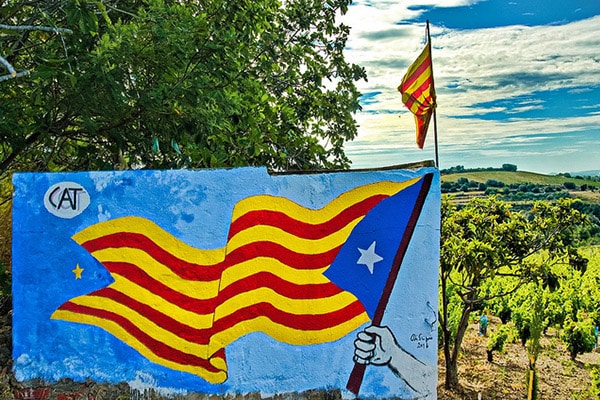
It is often claimed that the trigger of the recent independentist surge was the Constitutional Court’s rejection in 2010 of some of the key articles of the new Catalan Statute of 2006, which had been approved by the Catalan Parliament with two-thirds support, by the Spanish Parliament with an absolute majority (although crucially without the support of the conservative People’s Party, PP) and was ratified by the King of Spain, the head of state. However, as Victor Saura explains, the demonstrations on 11 September 2010 and 2011 – the Diada, the national day of Catalonia and showcase of the independence movement’s capacity for mobilisation– were very small-scale. They became massive, at around 1 million participants, only from 2012 onwards.
This shows two things. The Constitutional Court’s rejection of some of the key aspects of the 2006 Catalan Statute, especially those centred on acquiring further autonomy in the judicial system, were not that disproportionate. Yes, it upset and radicalised the most die-hard secessionists, but not the general public. As my colleague Ignacio Molina and I have explained elsewhere, it is important to note that in Catalonia voters have for some time been divided into three similarly-sized minorities: a third who are pro-independence, a third who are in favour of remaining in Spain and a third who are ambivalent, who may speak both Spanish and Catalan and who are uncommitted way. Among the latter are many who may now have shifted to either extreme.
Legally, and even politically, the approval in 2006 of the new Catalan statute was controversial. The Spanish Constitution has much flexibility when it comes to negotiating the distribution of competences between the central government and the autonomous regions, but it does have limits. And, according to the Spanish Constitutional Court, some of those limits had been breached by the Catalan statute. That on the legal side; on the political side, as César Colino and Jose A. Olmeda explain, the statute attempted to modify the Spanish Constitution by the back door in order to evade any blocking by the PP. However – to endure– it seems reasonable that any change in the Spanish Constitution would need to be backed by Spain’s two main political parties: the socialist PSOE and the conservative, PP.
So if the 2010 rejection of the Catalan statute by the Constitutional Court did not really spark mass support for independence, what did? There is a dossier by the Elcano Royal Institute explaining giving several reasons (it is a complex matter) but, according to Saura –and his thesis seems plausible–, the most important one was the economic crisis and the discontent with the austerity policies adopted to fight it (remember that Spain’s 15M ‘occupy movement’ started in Spring 2011), which convinced the then Catalan Premier Artur Mas to embrace the independence cause in order to stay in power. Faced with recession and a proliferation of corruption scandals in his party, CiU, Mas resorted to one of the oldest tricks in the book: with discontent at home, pull out the nationalism card and divert anger and frustration towards an external enemy. On that occasion, the PP government of Mariano Rajoy, which came into power at the end of 2011, started introducing austerity measures throughout Spain from early 2012.
The PP is a relatively easy target for Catalan independentist propaganda. Most Catalans view it as an external political force, much like the Tories in Scotland. It draws little local support (around 10% in regional elections and 20% in national on average) and can therefore be presented as extraneous agent devoted to oppressing and extracting. Unfair generalisations began to abound, on the lines of ‘Spain is robbing us’ and ‘we are hard-working Catalans, while the southern Andalusians are lazy and waste our money’. For many, the PP has also failed to adapt to the times: so far it has had no proper internal primaries (now the usual practice in Western European political parties) so it can easily be portrayed as an old-guard, old-fashioned and hierarchical party tainted by a lingering authoritarian Francoism (incidentally, an insult to Franco’s victims, since Rajoy is far from being authoritarian), which manipulates the judiciary and fails to respect basic human rights such as right to self-determination, or its Catalan personification, the ‘right to decide’.
Certainly, many in the PP and much of the elite in Madrid and other parts of Spain do not fully understand Spain’s cultural diversity and most do not share the idea of pluri-nationality. When I tell people I speak Galician at home, I often get weird looks: some appear to doubt my allegiance to Spain. I imagine that some in the two Castiles, Madrid or Andalucía consider that if one speaks a language other than Castilian, perhaps something is not quite right. They expect everyone to speak Castilian Spanish at home. Such a difference is greeted with surprise and even suspicion, which should evidently not be the case. As many foreign observers and visitors have noted, all Spaniards should embrace their country’s extraordinary cultural diversity, accepting that Spain has four official languages: Spanish, Catalan, Basque and Galician.
In Switzerland that is certainly the case. Every single canton has its own dialect. Those from Basel speak baseldütsch, from Zürich züridütsch, from Geneva Swiss French and from Lugano Swiss Italian (the former distinct dialects and the latter different languages from German). What is the problem? Are they any the less Swiss because of that? No! Are they less cosmopolitan because they speak a language that only a few hundred thousand people speak? Of course not! Is Galician helpful to learning Portuguese? Definitely. Is Catalan close to French? Absolutely!
Some people in Spain think that teaching in Catalan in the schools of Catalonia has created too many independentists. There is scant evidence to support this. As María José Hierro argues, indoctrination is mainly a thing of the home. If the parents are nationalists they are more likely to send their children to a catalanist school and hence it is more likely for them, in turn, to become nationalists. The more diverse the neighbourhood and the school the less likely it is for children to become nationalists. As Kiko Llaneras discovered, it can broadly be said that if a person’s surname is Catalan, the more likely it is for that person to support independence. That is why Barcelona, with many more immigrants from Spain and abroad, is far less nationalist than the rural areas of Catalonia. Again, the Elcano dossier explains the point.
The basic principle should be that a teacher should teach in her or his own language. In my case, I was taught maths, geography and history in baseldütsch not in High German. This was not a problem. Speaking and being taught in different languages is actually advantageous. It helps your brain to move from one language to another – fast. The problem arises when you discriminate against one of the official languages (when you only hire teachers that speak Catalan, for instance), or when you start telling the children that ‘Spain robs us’ or that ‘we are better than them’. That is when the issue starts to become worrying. Catalonia is an extraordinary region. In my view, it has always been Spain’s most international and modern region. In fact, it has helped to modernise Spain. Until last month, roughly 25% of all Spanish exports originated in Catalonia and one third of all Spanish export firms were Catalan. That says it all, although this has now changed after 2.000 of the biggest Catalan firms have moved their HQs to the rest of Spain. In certain ways, this mirrors what happened in Canada in the 1990s when due to the legal uncertainty generated by the referendum in Quebec, businesses moved from Montreal to Toronto.
The fact is that, as with the UK and the EU, much of Catalonia’s success is due to it being part of a larger single market, Spain’s, and this is not sufficiently acknowledged. To the contrary, many English and Catalans suffer in some respects from a similar delusion. Due to their relatively glorious past (which is a fact), many believe that they are better than their neighbours. The English in regard to their European neighbours (and also the Scots, Welsh and Irish, one could say), and the Catalans compared with their Spanish peers (even those in the same workplace). This sense of superiority makes them sit uncomfortably in a wider political community. They do not like being just another member of the club. They would like to run the club and, if they cannot, they become frustrated and want to leave. There is one word to describe this: nationalism. Nationalism based on a supremacism that leads to exclusion.
A foreign journalist asked me recently whether the Catalan issue was all about money: if Catalonia were poor it would never want to be independent. In a certain sense he was right. Those in favour of Catalan independence are certainly not the Zapatistas of Europe. They are usually the higher-earners in Catalonia, while the working class is largely against independence. That is why it is strange that so many left-wing people support Catalan separatism. They are supporting a movement that is to a large extent egoistic and supremacist and that shows very little solidarity with the broader community. This is very different from Scottish nationalism (again, please refer to the Elcano dossier). I remember one day some years ago in Brussels, at one of the dinners organised by the think tank CEPS, when I was sitting next to a German executive from a large German concern. He told me they were thinking of changing their headquarters from Barcelona to Madrid (which they eventually did last month): “with all this nationalist craziness, Barcelona was getting parochial, inward-looking”, he told me.
I have been feeling the same, and some academics that have lived in Catalonia for years, like Rafael Jimenez Asensio, too. Until roughly 10 years ago, Barcelona looked and felt far more international and cosmopolitan than Madrid. Now the gap has narrowed: Madrid is as vibrant, multicultural and wealthy as Barcelona. In fact, Madrid’s average per capita income is €36,400, while Barcelona’s is €34,600. Based on a lax tax regime and its central position as Spain’s capital city, Madrid has attracted a lot of business over the past decade. This has increased the feeling of grievance in Barcelona. There is a feeling that the central government is especially keen to support Madrid and not that interested in improving the infrastructures of Barcelona. Looking at the period from 1980 to 2016, of the four most prosperous regions in Spain –Madrid, the Basque Country, Navarre and Catalonia–, Catalonia was the only one whose per capita income increased less than the Spanish average. One wonders why, but it is unlikely to be Madrid’s fault.
For many in Catalonia such a situation is unfair. Madrid, with a population of over 6 million, has become Europe’s third-largest metropolitan area (after London and Paris) thanks to the support of the Spanish state. As Jacint Jordana rightly highlights, this has helped the Spanish capital to accumulate and absorb an abundance of resources, wealth, talent and, of course, power. All this has made many Catalans believe that to have influence and power in Europe it is necessary to be a nation-state, which carries with it a place at the high table in Brussels and a European commissioner. Neither Catalonia nor its capital city Barcelona have that, and therefore they are falling behind. The obsession with achieving independence comes partly from this desire, an aspiration that brings together people with very different agendas and backgrounds.
[An earlier version of this text was published on Medium.]


